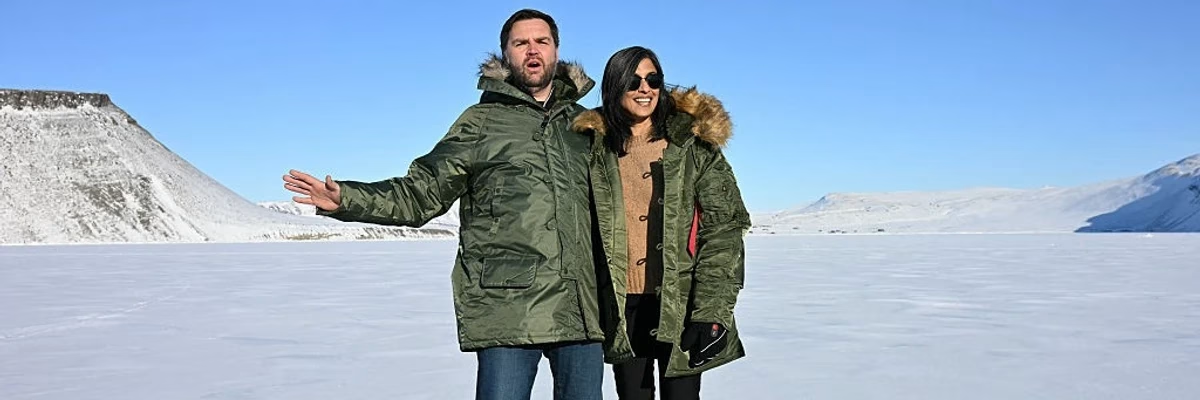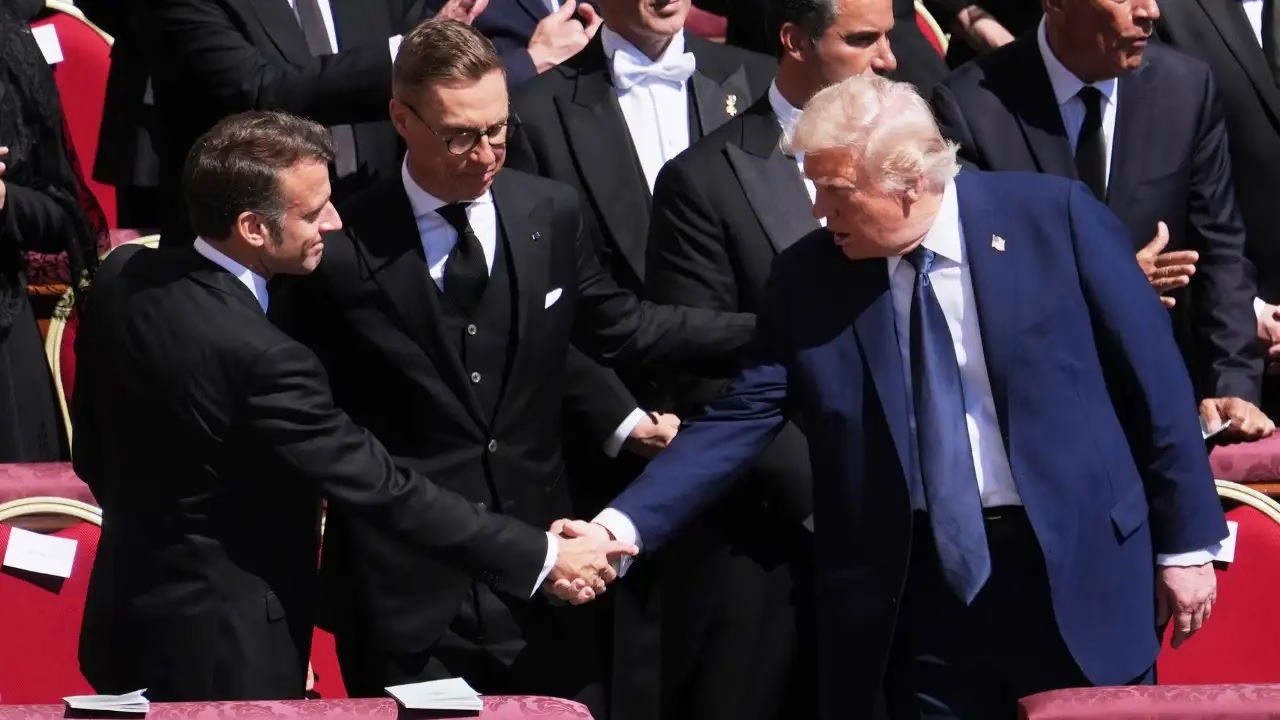By Mary Jones & Ben Emos | Monday, March 31, 2025 | 5 min read
Arriving in Greenland amid mounting scrutiny over a leaked group chat allegedly containing classified U.S. war plans, Vice President JD Vance took direct aim at Denmark and its European allies, arguing that the semi-autonomous territory would be better off under U.S. ownership than remaining part of the Danish kingdom.
Speaking just days after President Donald Trump reignited discussions about American control of Greenland, Vance made a direct appeal to Greenlanders, framing the U.S. as a stronger, more reliable partner.
“I think that you’d be a lot better coming under the United States security umbrella than you have been under Denmark’s security umbrella,” Vance said, making his case to both local leaders and the broader Greenlandic population.
But for a man who once boldly lied that Haitians were eating their neighbors’ dogs, it’s hardly surprising that Vance conveniently ignored key facts about Greenland’s security. While pitching the U.S. as a better alternative, he sidestepped the reality that Greenland is already protected under Denmark’s NATO membership and that the U.S. military has long maintained critical early-warning radars at Thule Air Base.
Yet, security wasn’t the only inconvenient truth Vance ignored. While making his case for U.S. control, he left out a crucial economic fact—Greenland’s GDP per capita is higher than that of Mississippi, West Virginia, China, Russia, and even some European nations.
By this measure, Greenland is far from a poor country. With a small population and vast mineral wealth—including rare earth elements, uranium, and untapped oil and gas reserves—it has the potential to be richer per capita than the United States itself. Yet, Vance framed Greenland as a struggling territory in need of American intervention.
This omission isn’t accidental—it’s deliberate. If Americans understood Greenland’s actual economic strength, they’d start asking why the U.S. is so eager to “take it under its wing” in the first place.
Because Greenland isn’t some forgotten Arctic outpost—it’s a resource powerhouse. And the Trump administration knows it.
Greenland: A Geopolitical Flashpoint or a Climate Battleground?
The world’s largest island holds immense strategic value, not just because of its location between North America, Europe, and the Arctic, but also because of its vast natural resources. Trump’s first attempt to buy Greenland in 2019 was dismissed as outlandish, but the renewed push—now delivered through Vance’s direct engagement—signals a more serious attempt to shift the political balance in the Arctic.
Yet, while Vance talks security, he ignores the biggest security risk Greenland actually faces—climate change. Melting ice sheets, rising sea levels, and shifting ecosystems pose far greater dangers to Greenland’s future than anything NATO or Denmark can’t handle militarily. And yet, the Trump administration, which Vance serves, has repeatedly dismissed climate change as a hoax.
Danish leaders have not been subtle in their response. Prime Minister Mette Frederiksen called the idea “absurd,” while Greenland’s Premier Múte Bourup Egede firmly stated that the island’s future “will be decided by Greenlanders alone.”
For Greenlanders, the U.S. proposal presents a difficult crossroads. While some may see the U.S. as a counterbalance to Denmark’s control, others fear that American involvement could mean economic and cultural disruption—and a push for resource exploitation under a government that doesn’t even acknowledge climate change as a legitimate threat.
As Vance presses forward with the Trump administration’s vision for Greenland, his selective storytelling and omission of critical facts make one thing clear:
This isn’t about Greenland’s security—it’s about power, resources, and a political spectacle wrapped in the language of diplomacy. And if history is any guide, Trump may be taking cues from Vladimir Putin’s playbook—leveraging territorial ambitions to strengthen his grip on power.
Putin has repeatedly used military action and territorial expansion to project dominance, from Georgia in 2008 to Crimea in 2014 and Ukraine in 2022. Could Trump, fresh off a second term, attempt his own version of this strategy? After all, he and Putin have had private discussions that no one—not even top U.S. officials—were privy to.
But Trump wouldn’t be the first American leader to eye foreign lands for political or economic gain. History is full of presidents pushing expansionist ambitions under the guise of national interest:
- James K. Polk (1840s): Championed Manifest Destiny, which led to the Mexican-American War (1846-1848) and the annexation of Texas, California, and much of the Southwest.
- William McKinley (1898): Used the Spanish-American War to claim Puerto Rico, Guam, and the Philippines, expanding U.S. influence overseas.
- Teddy Roosevelt (1903): Engineered Panama’s independence from Colombia to seize control of the Panama Canal Zone, securing a vital trade route.
- George W. Bush (2003): Invaded Iraq under the pretense of weapons of mass destruction, leading to decades of military entanglement.
Unlike these past leaders, though, Trump isn’t operating under a coherent strategy—he’s operating on impulse. His attempt to buy Greenland in 2019 was mocked as a joke, but now, with JD Vance pushing the narrative in Greenland, it’s clear that this ambition never really died.
But here’s where Trump will run into a brick wall. Unlike Russia, where democracy is a fragile illusion built on decades of authoritarian rule, the United States—despite Trump’s relentless attacks—has institutions that have endured for generations. He spent his first term trying to dodge, dismantle, and erode democratic guardrails, but they held. And they will again.
Trump is back in office, but his time is still limited. He can’t rule indefinitely, no matter how much he might wish otherwise. When his second term ends, he’s out—whether he accepts it or not.
He might dream of bold new conquests—Greenland, Canada, maybe even Panama—but the American people won’t let him turn reckless ambition into foreign policy.
Trump wants to play empire-builder, but America isn’t Russia, and he’ll never be king.
Copyright 2025 FN, NewsRoom.






